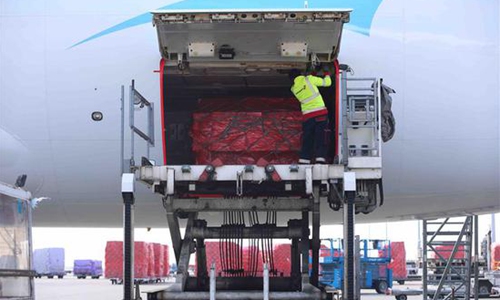China tightened supervisions and standardizations on urgently needed medical products to ensure quality over the weekend, as part of a move to address quality concerns amid growing exports to help the global fight against COVID-19.

Medical materials from China arrive at the Liege airport in Belgium, on March 18. A batch of 1 million donated medical masks were flown in Belgium on Wednesday, en route to France. The medical supply was mobilized by two Chinese charities to help combat the spread of COVID-19. (Photo: Xinhua)
On Saturday, China released new rules that require all non-medical masks must be up to its own or foreign quality standards before being exported, according to an announcement on the website of the Ministry of Commerce.
Meanwhile, exporters have to file for a written declaration that their medical products meet import countries' or regions' quality standards and safety requirements, according to the ministry.
A day prior to the move, the textile industry association in East China's Jiangsu Province issued the standard for polypropylene melt blown nonwovens, a critical material for making face masks, for its members - the first adoption of a standard in China.
The move came at a time when the pandemic is wreaking havoc worldwide, causing a sharp increase in demand for medical supplies, resulting in skyrocketing prices of material supplies due to the growing demand.
On Friday, British Airways announced that it would increase the number of flights to China to meet the growing demand for medical supplies. The company resumed direct flights between China and the UK in mid-April that were earlier suspended due to the COVID19, using all its passenger flights for cargo - the first time in the company's history.
Apart from the UK, many other countries that have been walloped by the virus, including the US, Spain, and Italy, have also been desperately seeking medical supplies causing a global supply shortage and chaos in the medical equipment market.
A source based in Central China's Hunan Province, who has invested in two mask production lines after the pandemic, told the Global Times the thing he worried about most recently is the severe shortage of melt-blown nonwovens, which has limited his company's production capacity and posed huge risk on his investment.
According to him, several businessmen like him have invested in the medical equipment after the pandemic as they predicated huge demand for personal protective equipment amid the pandemic, but the shortage of material supply has poured cold water on their plans and triggered anxiety for the investors.
With the material supply shortage, price rise, and even some products that are substandard, China has adopted measures, including customs inspection, export qualification check, and facilitating factories' production.
On March 31, Chinese Customs, Ministry of Commerce, and National Medical Products Administration jointly released a statement on medical supplies export, which detailed the specific requirement.
According to official data, from March 1 to April 4, China has exported life-saving supplies worth 10.2 billion yuan ($1.43 billion), including 3.86 billion masks, 37.52 million sets of protective outfits, and 16,000 ventilators.
While China has been increasing and improving its medical supplies to the world, many countries, by contrast, have issued a trade ban, which involves medical and even food supplies, according to a report by WHO on Thursday, following which the WHO and IMF jointly called for lifting such bans.
"As our members grapple with their response to the global health and economic crisis, we call for more attention to the role of open trade policies in defeating the virus, restoring jobs, and reinvigorating economic growth," WHO and IMF said in a joint statement.
"In particular, we are concerned about supply disruptions from the growing use of export restrictions and other actions that limit trade of key medical supplies and food," read the statement.


